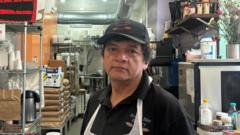As coffee prices in the US soar due to newly implemented tariffs, local café owners face tough choices that are reshaping the coffee-drinking experience. With Americans spending an estimated $100 billion annually on coffee, the tariff-driven price hikes are already prompting noticeable shifts in customer behavior; many patrons are opting for smaller, simpler coffee orders in response to rising costs.
Jorge Prudencio, owner of Bread Bite Bakery in Washington DC, has seen the effects of a 10% tariff that took effect on April 5. His Colombian coffee supplier has announced an increase in pricing, compelling him to consider raising the prices of his bakery items just to remain profitable. "Of course I'm worried," he shared.
Kamal Mortada, manager of Au Lait café, has been witnessing a steady decline in customers as prices kept climbing. The inflation spike during former President Biden’s term has made coffee unaffordable for some, with a significant price increase that saw ground coffee reaching a record high of over a dollar more than the previous year. “Most customers just get plain coffee now,” Mortada observed.
Across the country in San Francisco, Jenny Ngo, who owns Telescope Coffee, is also grappling with potential price hikes due to tariffs affecting her coffee sourced from Ethiopia and Guatemala. “We unfortunately project to raise prices again to sustain our business,” she remarked, echoing the sentiments of many cafe owners.
The implications of rising coffee prices extend beyond just the beverage itself; it also underscores a larger trend reflected in other staple foods. Egg prices, which became a symbolic measure of the economy, hit record highs with President Trump blaming previous administrations for rising costs, further complicating the financial landscape for small businesses.
Joel Finkelstein runs Qualia Coffee Roasters in Washington, DC, and has been dealing with ongoing price increases since tariffs were implemented. He anticipates another rise in costs, remarking, "We are going to see a decrease in sales." As the coffee landscape shifts under the weight of tariffs and inflation, small businesses and consumers alike are left to navigate a more expensive coffee culture.
Jorge Prudencio, owner of Bread Bite Bakery in Washington DC, has seen the effects of a 10% tariff that took effect on April 5. His Colombian coffee supplier has announced an increase in pricing, compelling him to consider raising the prices of his bakery items just to remain profitable. "Of course I'm worried," he shared.
Kamal Mortada, manager of Au Lait café, has been witnessing a steady decline in customers as prices kept climbing. The inflation spike during former President Biden’s term has made coffee unaffordable for some, with a significant price increase that saw ground coffee reaching a record high of over a dollar more than the previous year. “Most customers just get plain coffee now,” Mortada observed.
Across the country in San Francisco, Jenny Ngo, who owns Telescope Coffee, is also grappling with potential price hikes due to tariffs affecting her coffee sourced from Ethiopia and Guatemala. “We unfortunately project to raise prices again to sustain our business,” she remarked, echoing the sentiments of many cafe owners.
The implications of rising coffee prices extend beyond just the beverage itself; it also underscores a larger trend reflected in other staple foods. Egg prices, which became a symbolic measure of the economy, hit record highs with President Trump blaming previous administrations for rising costs, further complicating the financial landscape for small businesses.
Joel Finkelstein runs Qualia Coffee Roasters in Washington, DC, and has been dealing with ongoing price increases since tariffs were implemented. He anticipates another rise in costs, remarking, "We are going to see a decrease in sales." As the coffee landscape shifts under the weight of tariffs and inflation, small businesses and consumers alike are left to navigate a more expensive coffee culture.



















